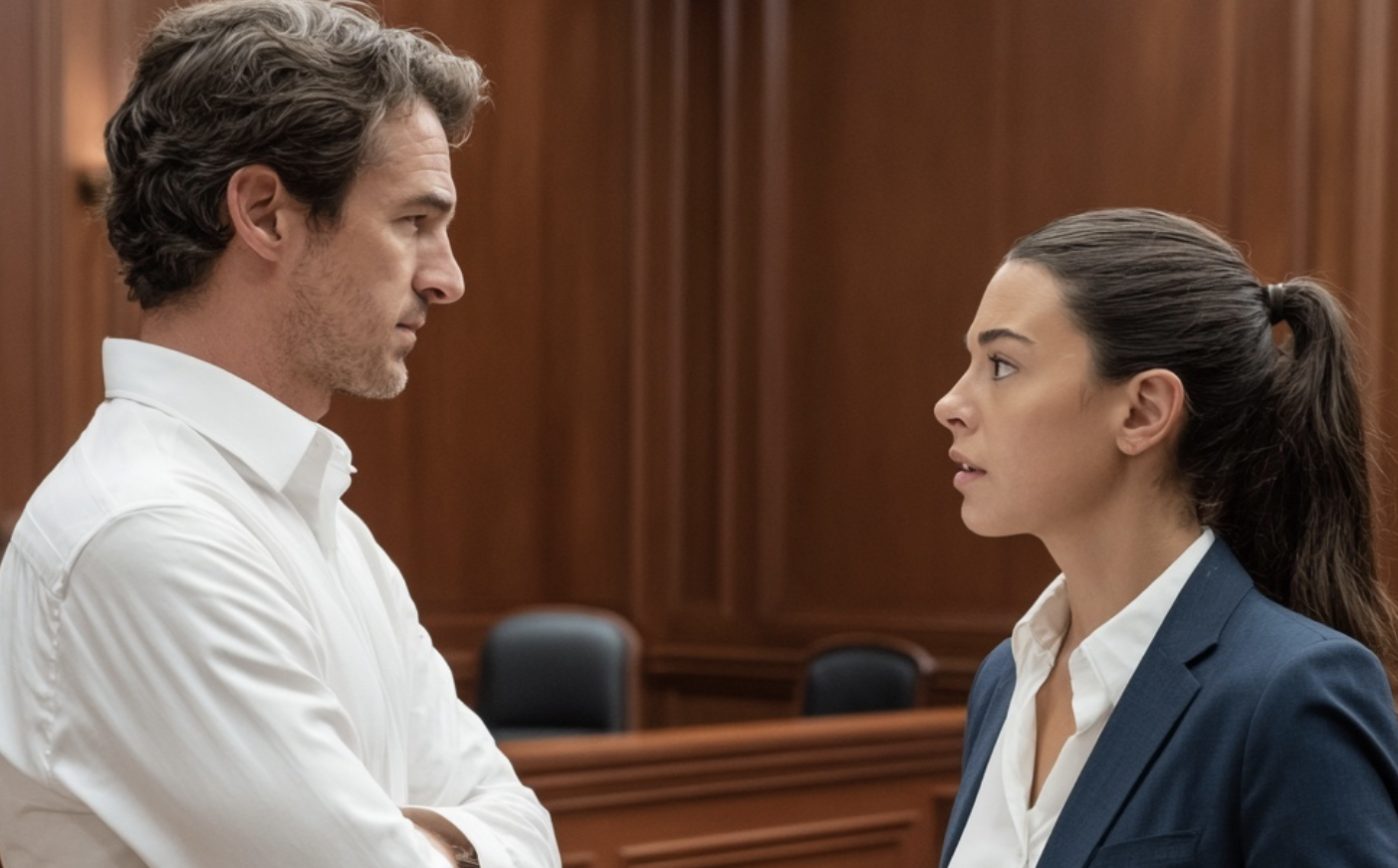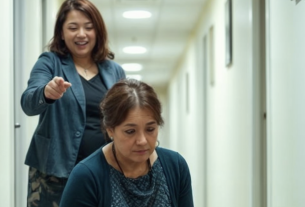Misha banged the cold cup of coffee down on the table and pressed the coffee machine button. Five minutes before they had to leave. Their old apartment had become a cramped box to him, every corner reminding him of twenty years of marriage. A marriage he’d decided to end three months ago.
— “You didn’t forget the documents, did you?” Ira’s voice came from the hallway.
Not his wife. Now just Ira.
— “I didn’t. I’m not a child,” Misha muttered, sipping the fresh coffee.
Ira walked into the kitchen. Thinner, with dark circles under her eyes—over these three months she seemed to have aged ten years. Misha turned toward the window. Looking at her felt awkward.
— “You didn’t have to come. I could’ve brought your things myself,” she said, opening the fridge and nervously rearranging jars.
— “It was on my way. And I need to pick up the keys.”
— “Can’t wait to get rid of me?”
Misha shrugged.
— “Ira, don’t start. We agreed.”
— “We agreed,” she banged the fridge door shut. “Of course. You always make all the decisions. You did for twenty years.”
Misha glanced at the clock. He couldn’t be late.
— “Listen, maybe we should go now? The lawyer asked us to come early.”
— “Your lawyer,” Ira gave a tense little laugh. “I don’t have money for a lawyer. You know that.”
Misha grimaced. Here we go.
— “You could’ve taken it from our joint funds.”
— “Joint?” Ira laughed, and the laugh was new, unfamiliar. “Do we even have anything ‘joint’? You never let me use the card.”
— “Ira, enough!” Misha stood up sharply. “You know, I’m actually glad I left. This is unbearable.”
— “Unbearable,” she repeated quietly. “And my life now is a non-stop party. A room in a communal flat. At fifty-two.”
— “I offered to pay for a rental.”
— “And then what? When your Svetochka asks you to stop?”
Misha wanted to answer, but his phone chimed with a reminder.
— “We have to go,” he cut her off.
They rode to court in silence. Misha was driving—their family Volkswagen, which would, of course, remain his. He’d paid for it, after all.
— “Will Dimka come?” Misha asked, unable to bear the silence.
— “No. He says it disgusts him to watch our divorce.”
— “He could at least show support.”
— “For whom?”
Misha didn’t answer. After the divorce announcement, his son had almost stopped speaking to him. He’d promised to come to the hearing, but changed his mind at the last moment.
The courthouse met them with echoing corridors and that institutional smell. By the doors of the courtroom, Misha’s lawyer was waiting—a lean man in glasses with a document folder.
— “Mikhail Valeryevich! Everything’s ready,” the lawyer shook his hand firmly. “And this is…?”
— “Irina Nikolaevna, my… wife,” Misha stumbled.
— “Without a lawyer?” a flicker of surprise crossed the attorney’s voice.
— “Yes,” Ira answered firmly.
The lawyer shrugged.
— “Well, that’s all the better for us…”
Misha saw Ira flinch.
— “Let’s step inside,” he tugged the lawyer by the sleeve. “We’ll go over the details.”
While they whispered in a corner, Ira sat on a bench. Misha watched her out of the corner of his eye—hunched, small, fiddling with her bag strap. Something jabbed inside him. Guilt? No, just nerves.
— “So, the property is straightforward,” the lawyer murmured. “The apartment was purchased during the marriage, but with your money. The car is yours as well. We’ll split the savings fifty-fifty; that’s the law. No hard feelings.”
— “Fine,” Misha nodded. “She isn’t really fighting.”
— “Excellent. We’ll finish quickly.”
But when they were called into the courtroom, Misha noticed something odd. People were crowding near the entrance. He recognized his father-in-law—a heavyset man with a cane—his mother-in-law, and… Ira’s brother with his wife. They nodded at him coldly, without greeting.
— “Ira, what is this?” he tugged her sleeve. “Why did you drag your parents here?”
— “They came by themselves. I happen to have a family that cares about me,” she snapped and went in.
Misha felt things slipping out of control. Not according to plan at all.
The judge—a woman with a short haircut and a stern gaze—opened the session in a dry tone. Misha sat straight, shoulders squared. Everything went to plan until they reached the division of property.
— “So, according to the plaintiff’s statement, he claims the apartment and the Volkswagen,” the judge looked up from the papers. “Your position, Mr. Sokolov?”
Misha’s lawyer stood.
— “Your Honor, both the apartment and the vehicle were acquired with my client’s funds. The spouse did not contribute financially; she worked as a nurse for a minimal salary.”
Misha sneaked a look at Ira. She sat with her lips pressed into a thin line.
— “Irina Nikolaevna, do you agree?” the judge asked.
Ira straightened. Something had changed in her eyes.
— “No, I don’t,” she said it quietly but firmly.
Misha tensed.
— “Explain your position to the court,” the judge set down her pen.
— “We bought the apartment with my parents’ money. They sold their house in the village and gave us most of the sum. And the car is registered to our son Dmitry.”
Misha jumped up.
— “That’s not true! I paid for everything!”
— “Sit down,” the judge said sternly. “Do you have proof, Irina Nikolaevna?”
— “My parents are here. And the documents…”
It felt like a bucket of cold water had been poured over Misha. His mother-in-law rose from the back row:
— “My husband and I provided three quarters of the apartment price. We have the paperwork and bank statements.”
— “Nonsense!” Misha turned to his lawyer. “Tell them!”
The lawyer rifled through the folder, flustered.
— “I… wasn’t informed of this.”
The judge frowned.
— “Are there documents confirming the transfer of funds?”
— “Yes, here,” Ira took a folder from her bag. “A gift deed and my parents’ account statements.”
Misha couldn’t believe his ears.
— “Ira, what are you doing? We had an agreement…”
— “About what, Misha? That you’d take everything?” Her eyes flashed. “I kept quiet for twenty years. Enough.”
Ira’s brother, Sergey, stepped forward:
— “And the car, on paper, belongs to Dima. Three years ago, Mikhail registered it in his son’s name to avoid paying taxes as a sole proprietor.”
— “Is that true?” the judge looked closely at Misha.
— “It’s… a formality,” Misha felt his plan collapsing. “I’m the one who uses the car!”
— “The owner is your son,” the judge examined the documents.
Misha looked helplessly at his lawyer.
— “You said this would be simple!”
— “You didn’t mention these details,” the lawyer hissed.
— “We’re taking a recess to review the new circumstances,” the judge announced. “The hearing will resume in a week. Please provide all property documents.”
In the corridor, Misha grabbed Ira by the elbow.
— “You set this up on purpose, didn’t you? You humiliated me!”
— “Me?” she gave a bitter smile. “You humiliated yourself. Thought I’d quietly move into my little room?”
— “You never cared about money!”
— “I trusted you, Misha. And you…”
Her father came up, leaning heavily on his cane.
— “Let her go,” he said sternly. “Stop ordering her around.”
— “You were always against me!” Misha backed away. “Always!”
— “Because we saw right through you,” his mother-in-law said quietly.
Just then Misha’s phone pinged. A text from Sveta: “How’s it going? Will you be done soon?”
Misha clenched his jaw. Nothing was going right. Not at all.
The week dragged on endlessly. Misha bounced between work, the rented apartment where Sveta waited, and meetings with the lawyer, who grew more and more grim each time.
— “Our chances are… ambiguous,” he said, leafing through the papers. “If the gift deed is genuine, and the car is clear as day…”
— “How could she!” Misha slammed his fist on the table. “She kept quiet about her parents’ money for twenty years!”
— “Did you know about it yourself?”
— “Well… yes,” Misha turned to the window. “But that was a long time ago. And anyway, I earned ten times more than she did!”
— “That won’t impress the court,” the lawyer took off his glasses. “Jointly acquired property is divided equally regardless of incomes. And if part of it is a gift from her parents…”
— “Find a way!” Misha raised his voice. “I’m paying you!”
On the day of the hearing he woke up with a headache. Sveta made coffee, but he barely touched it.
— “It’ll be fine,” she stroked his shoulder. “You said your ex is quiet and won’t make a scene.”
— “She used to be quiet,” Misha grumbled. “Kept silent for twenty years, and now suddenly found her voice.”
A surprise was waiting for him at court. In the corridor stood Dima—their son. Tall, with his father’s features, but a cold gaze.
— “Dim?” Misha moved toward him. “You came!”
— “Yeah,” his son said curtly. “For my car.”
— “What do you mean?”
— “Exactly what I said. It’s mine, and I want to take it. Mom said you’re claiming it.”
— “Dima, you understand…” Misha trailed off. His son looked at him like a stranger.
— “I understand. You decided to screw Mom over and take everything. Including my car.”
— “It’s not yours! I mean, formally yes, but…”
— “And in fact—whose?” Dima folded his arms.
Misha fell silent. At that moment Ira approached with her parents.
— “Dimochka!” She hugged her son. “You came after all!”
— “Couldn’t miss it,” he hugged her back. “Hi, Grandpa, Grandma.”
He didn’t even glance at Misha.
In the courtroom the air was taut. The judge reviewed all the documents and finally looked up.
— “After analyzing the papers presented, the court has established the following. The apartment was purchased with substantial financial assistance from Irina Nikolaevna’s parents. This is confirmed by bank statements and the gift deed. The Volkswagen is registered to Sokolov Dmitry Mikhailovich, as evidenced by the vehicle title and the donation agreement from father to son.”
Misha clenched his fists. The lawyer beside him looked sour.
— “In view of these circumstances, the court finds the plaintiff’s claims to exclusive rights to the apartment and car unfounded.”
— “That’s unfair!” Misha leapt up. “I supported the family all these years! I paid for the apartment!”
— “Sit down, Citizen Sokolov,” the judge said sharply. “Do not interrupt.”
— “My parents’ money should count too,” Ira said quietly. “And I worked all these years as well.”
— “As a nurse!” Misha snorted. “Your salary wouldn’t even cover the utilities!”
— “And who watched Dima while you were building your business?” For the first time, Ira raised her voice. “Who worked night shifts and then did everything at home in the morning?”
— “Order in the court!” The judge banged the gavel. “The court rules as follows: the apartment is recognized as jointly acquired property with consideration of the contribution by the respondent’s parents. The vehicle is the property of Sokolov Dmitry Mikhailovich.”
— “I object!” Misha flushed. “This is a setup! They planned it all!”
— “One more outburst and you’ll be removed from the courtroom,” the judge warned.
Dima stood up:
— “Dad, enough. You’ve done plenty already. You left for another woman, kicked Mom out of the house. Now you want to take my car too?”
— “I didn’t kick her out! She left on her own!”
— “After you brought your new woman into our home! While Mom was on a night shift!” Ira’s eyes filled with tears.
A murmur ran through the room. The judge struck the gavel again.
— “This session is now closed to the public. Everyone except the parties, please leave.”
When the others had gone, the judge took off her glasses and looked at the spouses wearily.
— “Listen, we can keep this going forever, but let’s resolve it civilly. The documents speak for themselves. The apartment is joint property with consideration of the contribution by Irina Nikolaevna’s parents. The car belongs to your son. What remains are the bank accounts and other assets.”
Misha sat red-faced, his jaw muscles twitching. Ira stared at the floor.
— “Your Honor,” the lawyer began. “My client is prepared to reconsider his position regarding the vehicle. But the apartment…”
— “I’ll be living in the apartment,” Ira suddenly said firmly. “I have nowhere else to go. Mikhail has a new family and an income. I have only this apartment.”
— “All my money is tied up in the business!” Misha hit the table. “I can’t just give up the place!”
— “Not ‘just give up,’” the judge looked at him sternly. “In accordance with the law. You can compensate her for your share if she remains in the apartment.”
Misha opened his mouth, but Dima cut him off:
— “You know, Dad, I always thought you were fair. Remember how you’d say, ‘A man has to answer for his family’? What happened to that man?”
Silence fell. Misha slowly sank back into his chair.
— “I propose a compromise,” the judge continued. “The apartment remains with Irina Nikolaevna. The car belongs to the son. Mikhail Valeryevich receives compensation from the jointly acquired funds. Does everyone agree?”
Misha was quiet for a long time, then nodded reluctantly.
— “Fine. I agree.”
After the decision was announced, they went out into the corridor. Ira’s parents hurried to their daughter, and Dima drew his father aside.
— “Give me the car keys.”
Misha silently handed over the fob.
— “Dima, let’s talk…”
— “About what? How you humiliated Mom for twenty years? Or how you brought your new woman home while Mom was on duty?”
— “How do you…?”
— “A neighbor called. And Mom kept quiet, endured it. Her whole life.”
Misha lowered his eyes.
— “I didn’t want it to turn out like this.”
— “But this is exactly how it turned out,” Dima took the keys. “You know, I was always proud of you. And now…”
He didn’t finish and walked to his mother. Misha was left standing alone in the hallway.
It was drizzling outside. Misha stood under the awning, not knowing where to go. He dialed Sveta.
— “Hello, where are you? Can you pick me up?”
Ira was the last to come out, arm in arm with her son. Her parents were waiting in the car.
— “Dima, will you drive me to the apartment? I need to pick up some things.”
— “Of course, Mom.”
Misha stepped toward them.
— “Ira, listen…”
She stopped. There was no anger in her eyes, only fatigue.
— “Misha, everything’s already been said. Twenty years and three months’ worth has been said.”
— “I didn’t think it would end up like this.”
— “How did you think?” she smiled sadly. “That I’d always keep quiet? That my parents wouldn’t stand up for me? That Dima wouldn’t find out?”
— “Mom, let’s go,” Dima tugged her hand. “The rain’s getting heavier.”
— “I just wanted to say… I’m sorry.”
Ira shook her head.
— “You know, I should thank you. If not for this divorce, I’d never have learned how strong I am.”
She turned and walked to the car. Dima followed without even glancing back at his father.
A month later, Ira moved back into the apartment for good. Dima helped with the renovation—they repainted the walls, replaced the furniture. Her parents gifted new appliances. For the first time in twenty years, she decided for herself what color curtains to hang and where to put the couch.
At work, Ira took extra shifts. Her colleagues noticed the change—she seemed younger, stood straighter, started to smile.
And Misha… Misha moved out from Sveta’s two months later. Without an apartment, without a car, and with a damaged reputation, he wasn’t so appealing anymore. He rented a small studio and sometimes called Dima, but his son answered rarely and briefly.
Once he ran into Ira at the supermarket. She looked fresh, well-kept, and even—apparently—happy. A man stood beside her.
— “Hi, Ira,” Misha nodded awkwardly.
— “Hello,” she nodded back. “How are you?”
— “Fine… working.”
— “That’s good,” she smiled gently. “Dima asked me to tell you he’ll stop by this weekend. If you’re not busy.”
— “Of course I’m not,” Misha felt his eyes sting. “Thanks for letting me know.”
They went their separate ways—each down their own road. And Ira no longer looked back.



